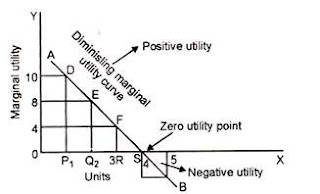Law of Diminishing Marginal Utility
The law refers to the common experience of every consumer. Suppose a person starts eating mango one after another. The first mango gives him great satisfaction/pleasure. By the time he starts taking the second, the edge of his appetite has been blunted, and the second mango yields less satisfaction; the satisfaction of the third will be less than that of the second, and so on. The additional satisfaction will go on decreasing with every successive mango till it drops down to zero.
|
Units (Mango)
|
Total Utility (Unit of satisfaction)
|
Marginal utility (unit of satisfaction)
|
|
1
|
20
|
20
|
|
2
|
38
|
18
|
|
3
|
53
|
15
|
|
4
|
64
|
11
|
|
5
|
70
|
6
|
|
6
|
70
|
0
|
|
7
|
62
|
-8
|
|
8
|
46
|
-16
|
It will be seen from the table that the total utility of a commodity is maximum (i.e., 70) when the marginal utility is zero (i.e., at the 6th unit).
Diagrammatic Representation:
Limitation of the Law
1. Suitable Unit: If you begin taking water by the spoonful when thirsty, the utility may at first rise instead of falling.
2. Suitable Time: The law will not apply if the commodity is not taken within a certain time. If you take your first meal at 10 a.m. and the next meal at 2 p.m., there is no reason why the utility of the second meal may be less. But, you are compelled to take the second meal within an hour of your having taken the first, the law will apply, and the utility of the second meal will be less.
3. No change in consumer’s tastes: Another assumption is that the character of the consumer does not change.
– The more music one hears
– The more literature one reads
-The more wine a drunkard takes
-The more money a miser has
-The greater is the utility in each case.
4. Normal Person: The law of diminishing marginal utility applies to normal persons and not to an abnormal person like a miser. In the case of a miser, irrational person, the law will not hold good.
5. Constant Income: It is also essential that the income of the consumer remains the same. Any change in income will falsify the law.
6. Rare Collection: In the case of rare collection, the law does not hold good. Like the collection of ancient coins.
7. Change in Other People’s Stock: Suppose, I have a rival in collecting ancient coins, and somehow, he loses his collection, the utility of my collection automatically goes up.
-Utility of my telephone will increase if the number of telephone collections increases.
-Value of your land goes up without any change in its dimensions when a railway station has been built nearby.
8. Other Possessions: The law ignores the relation of complementary. For example, a carriage is useless without a horse.
9. Fashion: The utility of my dress goes up when that dress comes in fashion.
10. Not Applicable to Money: The more money you have, the more you want.
